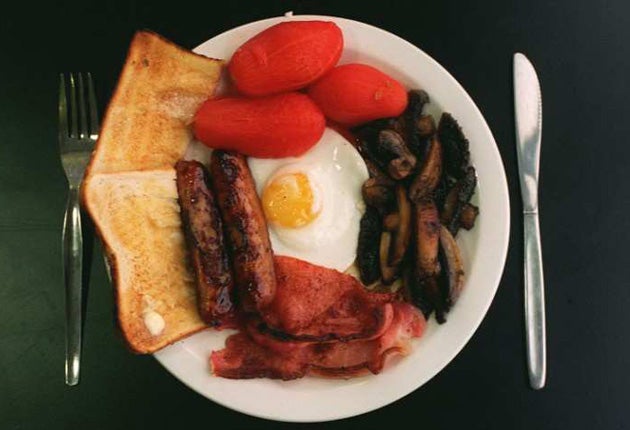Atkins: A diet you can trust?
It's high in fat and cholesterol, but Dr Robert Atkins' carb-free regimen is back in favour. Esther Walker knows why

A study in Australia this week found that the Atkins diet is, along with Weight Watchers, the most successful of all time; slimmers lose on average 11 pounds in two months on the carbohydrate-free diet.
The diet, created by Dr Robert Atkins, was first popular in the Seventies and then enjoyed a revival in the early Noughties when an army of skinny Hollywood stars including Jennifer Aniston and Renée Zellweger attributed their weight loss to a protein-only diet.
If you grew up in the Eighties like I did, when sugar was rebranded as "energy", fat was the enemy, not carbohydrates. Eating fat and protein to lose weight sounded completely counter-intuitive.
I went on the Atkins diet five years ago after putting on two stone at university – I arrived at freshers' week weighing eight stone and left weighing 10. Extra weight doesn't suit me. I don't look glossy like Nigella, or curvaceous like Kelly Brook. I look like a pudding; my skin looks waxy and congested, my ankles and wrists swell up and my eyes disappear behind my cheeks.
I was sceptical about the diet, yet the idea of eating a lot of cream and bacon and cheese and cutting out carbohydrates seemed easier than eating less. I was never that strict about it. I just kept the principles in mind: cut down on the bread, pasta, potatoes and sugar, load up on cheese, ham and mayonnaise.
There was no way I was going to cut out fruit, though. This is one of the things you are supposed to do in the initial stages, in order to achieve the state of "ketosis" – whereby your body starts burning its fat stores. I was put right off that when I met a girl who was in ketosis – not only did she stink (ketosis produces foul-smelling chemicals called ketones), she told me she was miserable because of it: I wasn't prepared to suffer that much to be thin.
After a painless fortnight eating fewer carbs, the weight started to come off. I became an Atkins zealot: this marvellous thing had made me thinner and feel better, and I wanted to tell everyone about it.
But there grew a steady chorus of opposition to the Atkins concept. Evidence emerged that staying on the diet for too long was bad for your kidneys – it became pretty much the most controversial thing you could do with food.
Whenever I explained to someone that I wasn't eating carbs, they were mostly disgusted. "Isn't that diet incredibly damaging?" they would say, usually before ramming roast potatoes or a crisps into their mouth.
After a while, I stopped fighting negative opinions about Atkins; explaining, over and over again, that you didn't have to follow the diet to the letter was boring. I just kept quiet and enjoyed the feeling of getting lighter all the time. It was like being a helium balloon.
Of course, the odd piece of toast slipped in – plus the occasional potato, a rushed bowl of pasta – so, after the initial half-stone plummet, the rest of the weight came off slowly. It took me about a year to lose the two stone I had put on. But knowing that it was working was enough.
Despite the initial strength of the opposition to Atkins, the idea that it isn't fat, but sugar, that makes you overweight has caught on. It's gratifying to us Atkins converts that, after getting so much bad press, we were right all along.
Subscribe to Independent Premium to bookmark this article
Want to bookmark your favourite articles and stories to read or reference later? Start your Independent Premium subscription today.

Join our commenting forum
Join thought-provoking conversations, follow other Independent readers and see their replies